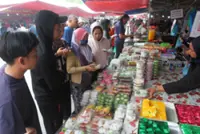KOTA KINABALU: A simple yet age-old native Kadazandusun ritual to awaken the spirit of plants and seeds marked the launching of a seed revival programme in conjunction with the Harvest Festival in Sabah on Sunday (May 22).
A ritual conducted by Bobohizan (or native priests and priestesses) saw a chant of prayers using the classic Kadazan language and a sprinkling of water from selected leaves among other ceremonial acts carried out.





